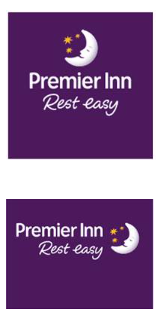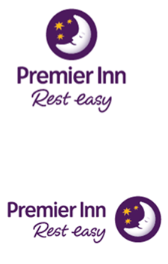In brief
- While the lack of confusion evidence is not fatal, the longer the use complained of has continued without any such evidence arising, the more significant its absence is.
- Survey evidence can be an expensive error. Here, the survey results failed to establish a reputation or enhanced distinctiveness.
- If there has been no change in consumers' economic behaviour, there is unlikely to be detriment or unfair advantage caused, and the use is more likely to be fair competition.
Background
easyGroup brought proceedings against hotel chain Premier Inn for its use of the sign 'Rest easy' on the basis that it infringed easyGroup's registered trade marks for ‘easy hotel’, ‘easy’ (a device mark) and ‘Rest Easy Apartments’. easyGroup obtained the Rest Easy Apartments mark from a third party, having reached a settlement with them involving the transfer of the mark. Premier Inn has used 'Rest easy' as a tagline since early 2021, following a rebranding exercise.
| The registered marks |
Signs complained of |
UKTM used as signs complained of |
|
Series mark: 'EASYHOTEL' and 'easyHotel'
Device series mark:

'Rest Easy Apartments'
|

'REST EASY'
|
 |
High Court decision
The High Court dismissed easyGroup's infringement claim.
(i) No likelihood of confusion between 'Rest Easy Apartments' and 'Rest easy'
The court held there was "a very low level of distinctiveness" in the 'Rest Easy Apartments' mark and concluded there was no likelihood of confusion. The words ‘Rest easy’ were an idiom, with very low distinctiveness and not a dominant or independent part of the signs used by Premier Inn so the average consumer would not likely be confused “into thinking that Premier Inn had taken over the Rest Easy Apartments business or that [they] were economically linked”.
Where there were similarities, these had low distinctiveness, and in fact there were significant differences.
There was also an absence of actual confusion. Tellingly, despite searching over 17 million emails, 14 million files and over 120 terabytes of data, easyGroup provided no evidence of consumers making any link. Premier Inn's analysis of roughly six million pieces of customer feedback similarly produced no evidence of such a link. The court noted that while an absence of actual confusion evidence is not fatal to an infringement claim, "the longer the use complained of has gone on in parallel with use of the trade mark without such evidence emerging, however, the more significant it is." With almost four years of parallel use, the court found it likely that, if confusion did exist, "some evidence of it would have become apparent in that period".
(ii) Premier Inn did not take unfair advantage or cause detriment to stylised 'easy' and 'easyHotel' Marks
The court held that the 'easyHotel' mark had a reputation for hotel and temporary accommodation, a low level of distinctiveness, and moderate enhanced distinctiveness (only in its use in white script on an orange background). However, the stylised 'easy' mark had no inherent distinctiveness, no reputation or enhanced distinctiveness for any of the services for which it was registered. easyGroup had been permitted to adduce survey evidence to demonstrate this mark's reputation and enhanced distinctiveness, but the court held the survey did not demonstrate this for hotel services.
Interestingly, easyGroup expressly disavowed any intention to rely on a 'family of brands' or 'family of marks' argument and so the court ruled it could not pursue a line of argument about the easy 'travel family'. The court commented that "To hold that a trade mark could obtain reputation and enhanced distinctiveness in particular services because of an association with trade marks sharing some similarity, but registered for and/or trading in different services would be to extend the protection given by trade marks well beyond the protection provided for under statute".
The court concluded that easyGroup had failed to establish that there was a link between Premier Inn's signs and the stylised easy/easyHotel marks in the mind of the average consumer.
Further, even if a link could be established, easyGroup had not evidentially demonstrated detriment, having just made “mere suppositions”. There was no evidence of a change in economic behaviour such as a reduction in its hotel revenue following the launch of Premier Inn’s ‘Rest easy’ campaign nor was there a change in the economic behaviour of Premier Inn’s consumers, despite its campaign having run for almost four years. The Court held easyGroup was seeking “illegitimately to prevent… competition, by claiming exclusivity of the word ‘easy’ in the hotels sphere, contrary to the interests of consumers”. Meanwhile, Premier Inn was not taking advantage of easyGroup's Marks but was "launching its own rebrand by way of fair competition".
Takeaways
Descriptive elements limit protection - the case highlights ongoing challenges for easyGroup in protecting marks containing the descriptive word 'easy'. The court emphasised that infringement claims for taking unfair advantage or causing detriment to the distinctive character or repute of a trade mark should not be used to illegitimately prevent competition by claiming exclusivity over common words, as this would be contrary to consumer interests.
Evidence of actual confusion (or a lack of such evidence), whilst not necessary, is persuasive - despite comprehensive data searches by both parties, the complete absence of evidence of actual consumer confusion over nearly four years of parallel use proved fatal.
Survey evidence has limitations and comes at a cost - the court noted the challenges in using survey evidence to establish distinctiveness in descriptive trade mark cases, finding that even professionally conducted surveys may fail to demonstrate the necessary consumer associations.